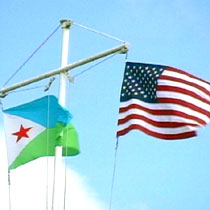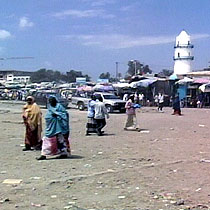-
(单词翻译:双击或拖选)
Djibouti
09 May 2007
The United States is moving ahead with a new military command structure for Africa, consolidating1 all U.S. activity on the continent. Africa Command will not be complete until late next year (last quarter of 2008), but Pentagon officials say there are no plans to send in any additional combat units. The 1700 American troops now in Djibouti work on training, security and humanitarian2 projects. Malcolm Brown visited the U.S. force on the Horn of Africa and has this report.

Djibouti and U.S. flags
 |
| Djibouti |
This predominantly Muslim country of fewer than a million people also has become a key security partner of the United States.
The U.S. military has been in east Africa on counterterrorism duty since al-Qaida's attacks on New York and Washington nearly six years ago. What the Americans learn in this region is expected to help shape the new Africa Command.
Rear Admiral Timothy Moon is deputy commander of the current U.S. task force in Djibouti. He said, "A lot of things we've done can be viewed as a test bed for processes and concepts that they could put into action over the entire continent."
The task force focuses heavily on humanitarian work, such as building or upgrading medical clinics and schools in Djibouti as well as other countries in the region.
Command Chief Master Sergeant4 John Harris says the troops go beyond the traditional military role. "A lot of what we do is probably similar to what you read about in Iraq, [or] in Afghanistan, after the fighting is over and it is calmed down. It's helping5 that nation rebuild."
Unlike in Iraq or Afghanistan, this nation-building in Djibouti does not follow war. In fact, it is designed to prevent conflict, in large part by addressing widespread poverty.
In a country where most of the land is harsh desert, with few natural resources, the average annual income is about $1,000.
So, U.S. troops have turned into aid workers. Even military chaplains are involved, by reaching out to local religious leaders.
Chaplain Robert O'Dell said, "We don't focus on the fact that you're Muslim, or Christian6, or Catholic, or another faith group, but rather how we can work together to partner, to have a common goal -- and that is to take care of the communities in which they serve."
Another way to promote stability is by upgrading local soldiers' skills. Major John Hill plans military training programs in Djibouti.
"We want them to be able to teach themselves how to train what we have taught them. Our goal is to professionalize that army or that unit that comes in, so that we, in turn, can let them go and pass that knowledge on their units and their soldiers across the country."
If Africa Command ever has to go beyond training and take direct military action in Africa, there will be inevitable7 echoes of the ill-fated American intervention8 in Somalia in the early 1990s.
According to one prominent critic of U.S. African policy, Washington's more recent actions in Somalia are already undoing9 the good works of the troops in Djibouti. John Prendergast is senior adviser10 to the International Crisis Group.
"You can't sit there and analyze11 only what the right hand is doing when the left hand has got a whole other agenda,” says Prendergast. “We're firing rockets into southern Somalia in the middle of this invasion by the Ethiopians. We can't then point to all the nice wells we built last year. People don't care. They see the United States once again attacking a Muslim country, looking out for number one and its interest."
For its part, the Pentagon hopes that its new command structure will ensure that the military and diplomatic arms of the U.S. government are pulling in the same direction.
Rear Admiral Timothy Moon says this is the biggest lesson the U.S. military has learned on the Horn of Africa. "The United States really has to have an interagency effort, really bring all the elements of national power to bear. And this is everything: diplomacy12, military, economic. And until we do that, we're going to be hard pressed to achieve the objectives over here."
 收听单词发音
收听单词发音
1
consolidating

|
|
| v.(使)巩固, (使)加强( consolidate的现在分词 );(使)合并 | |
参考例句: |
|
|
|
2
humanitarian

|
|
| n.人道主义者,博爱者,基督凡人论者 | |
参考例句: |
|
|
|
3
gulf

|
|
| n.海湾;深渊,鸿沟;分歧,隔阂 | |
参考例句: |
|
|
|
4
sergeant

|
|
| n.警官,中士 | |
参考例句: |
|
|
|
5
helping

|
|
| n.食物的一份&adj.帮助人的,辅助的 | |
参考例句: |
|
|
|
6
Christian

|
|
| adj.基督教徒的;n.基督教徒 | |
参考例句: |
|
|
|
7
inevitable

|
|
| adj.不可避免的,必然发生的 | |
参考例句: |
|
|
|
8
intervention

|
|
| n.介入,干涉,干预 | |
参考例句: |
|
|
|
9
undoing

|
|
| n.毁灭的原因,祸根;破坏,毁灭 | |
参考例句: |
|
|
|
10
adviser

|
|
| n.劝告者,顾问 | |
参考例句: |
|
|
|
11
analyze

|
|
| vt.分析,解析 (=analyse) | |
参考例句: |
|
|
|
12
diplomacy

|
|
| n.外交;外交手腕,交际手腕 | |
参考例句: |
|
|
|















